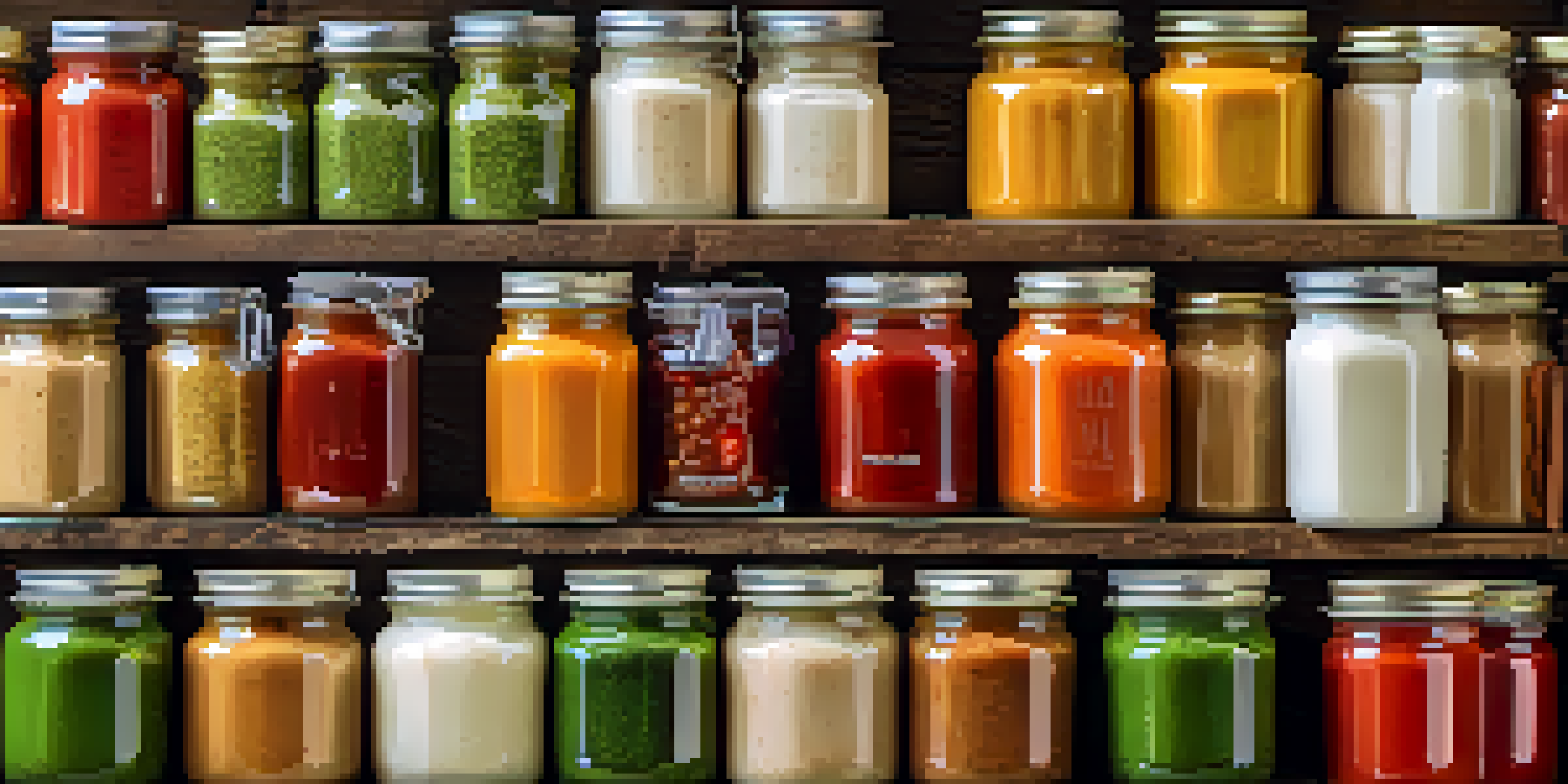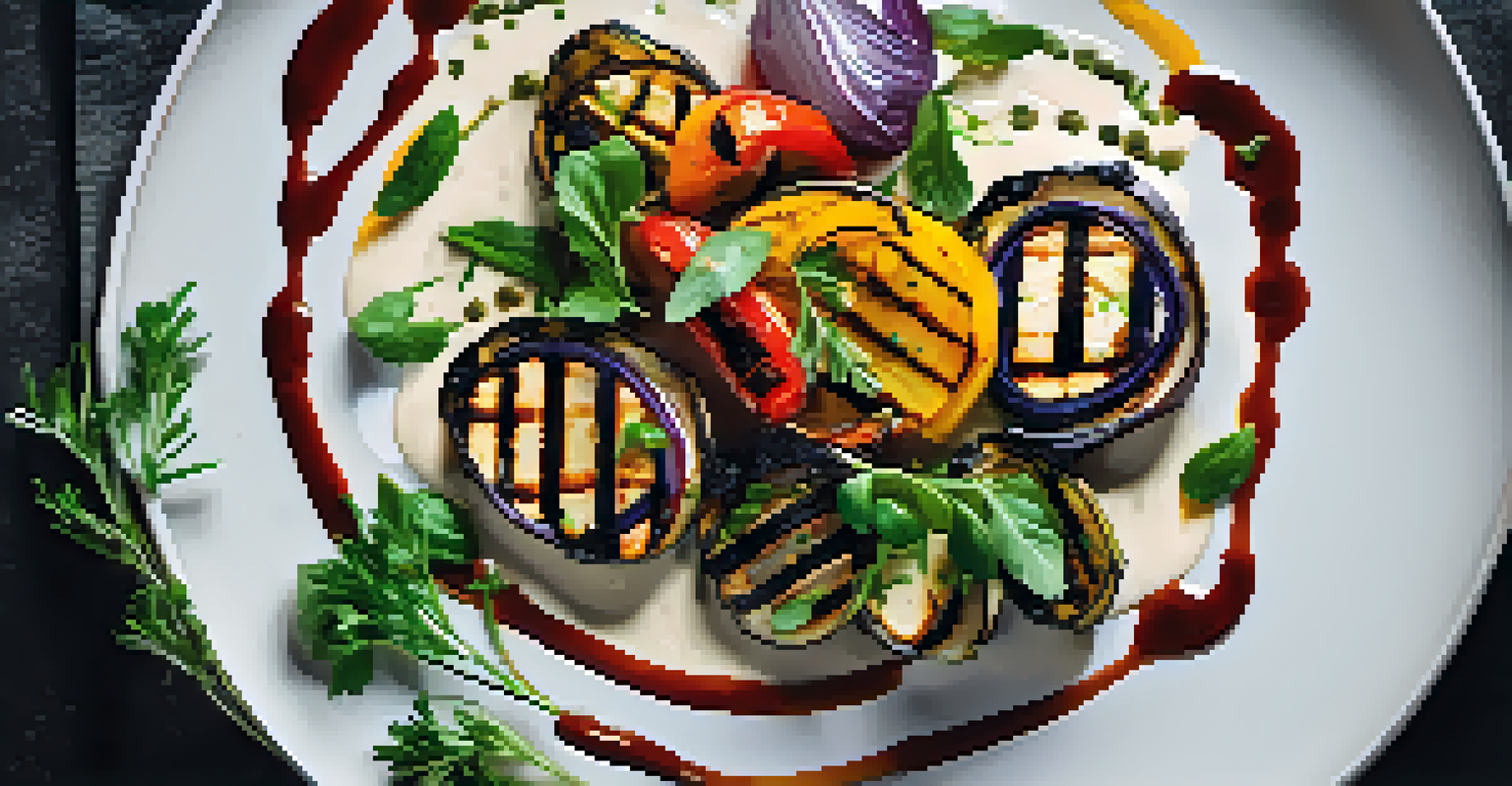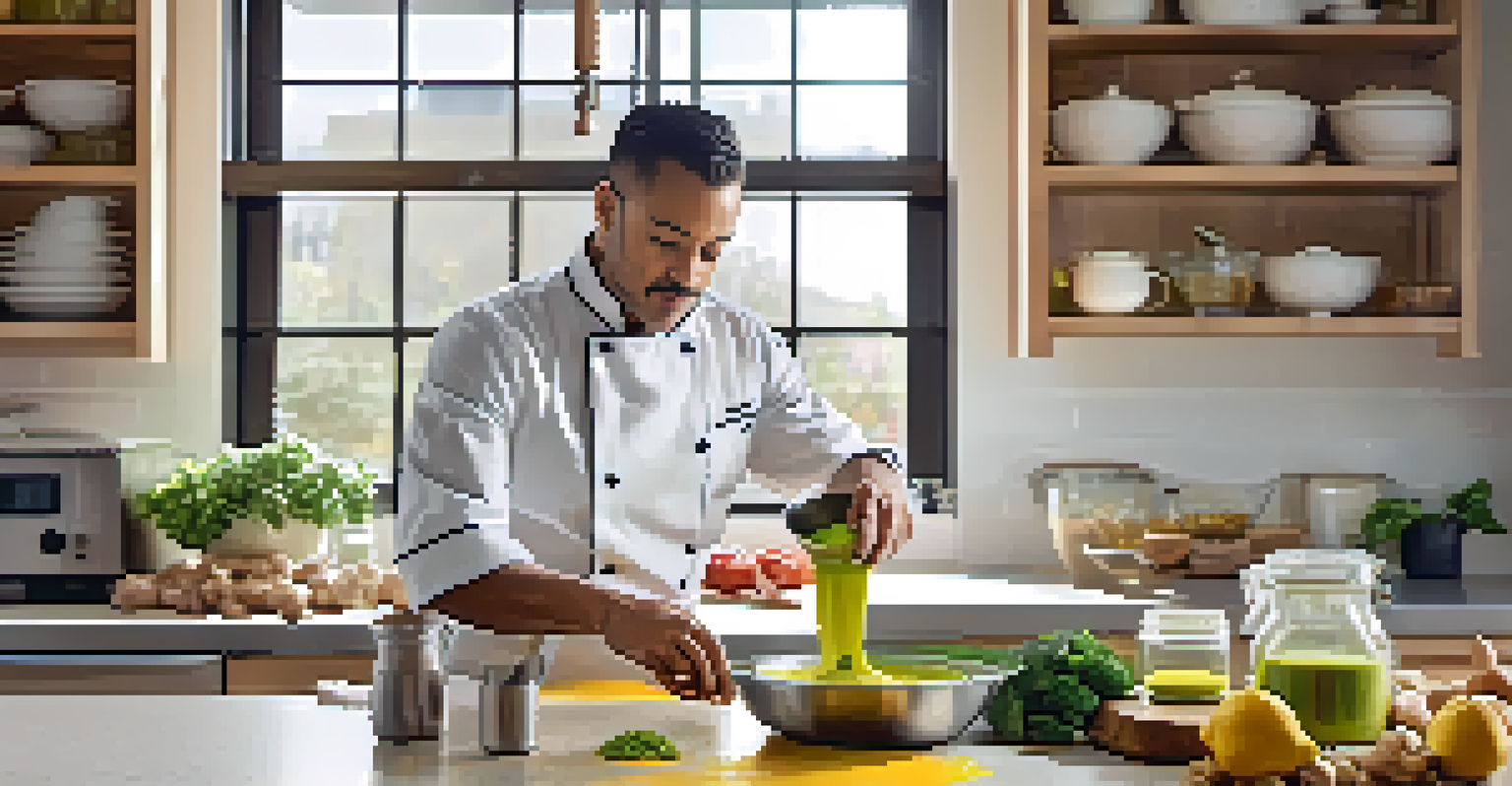Creating Depth: Vegan Sauces and Their Flavor Boosting Power

Understanding the Role of Sauces in Vegan Cooking
Sauces are the unsung heroes of any meal, acting as the glue that ties flavors together. In vegan cooking, they can transform simple ingredients into culinary masterpieces. Think of a sauce as a melody that harmonizes the various notes of your dish, bringing out the best in every bite.
Sauces are the unsung heroes of any meal, acting as the glue that ties flavors together.
When it comes to plant-based eating, sauces can add richness and depth that some might believe only dairy or meat can provide. For instance, a creamy cashew sauce can mimic the texture of traditional cheese sauces while delivering a satisfying umami flavor. This versatility allows for endless creativity in the kitchen.
Using sauces wisely can also help in meal prep, making it easier to whip up a quick, flavorful dish. A well-crafted sauce can turn leftover grains and veggies into a delightful meal, proving that vegan cooking can be both simple and satisfying.
Essential Ingredients for Flavorful Vegan Sauces
The foundation of any great sauce lies in its ingredients. For vegan sauces, you'll often find staples like nuts, seeds, herbs, and spices as primary components. These ingredients not only enhance flavor but also bring in healthy fats and nutrients, making your meal more balanced.

For example, tahini, made from ground sesame seeds, adds a rich, nutty flavor to dressings and sauces alike. Combine it with lemon juice, garlic, and water for a creamy dressing that pairs beautifully with salads or roasted vegetables. This kind of ingredient synergy is what makes vegan sauces truly special.
Sauces Enhance Vegan Dishes
In vegan cooking, sauces act as flavor enhancers, transforming simple ingredients into delightful meals.
Additionally, don't underestimate the power of acids, such as vinegar or citrus juice, in brightening flavors. A splash of balsamic vinegar can elevate a simple tomato sauce, adding complexity and depth that will have your taste buds dancing.
Classic Vegan Sauces Everyone Should Know
There are a few classic vegan sauces that every home cook should have in their repertoire. One of the most beloved is the classic marinara sauce, made from ripe tomatoes, garlic, and herbs. It's incredibly versatile, serving as a pasta sauce, pizza base, or even a dipping sauce for breadsticks.
Cooking is like love. It should be entered into with abandon or not at all.
Another staple is the versatile pesto, traditionally made with basil, garlic, pine nuts, and olive oil. By substituting nutritional yeast for cheese, you can create a delicious vegan version that packs a flavorful punch. Spread it on sandwiches or mix it into grains for a delightful meal.
Don’t forget about the power of BBQ sauce as well! A homemade vegan BBQ sauce made with tomatoes, vinegar, and spices can add a smoky sweetness to grilled veggies or tofu, making your summer cookouts memorable.
Exploring Global Vegan Sauce Varieties
Vegan sauces can also take you on a culinary journey around the world. For instance, a Moroccan harissa sauce, made with chili peppers, garlic, and spices, can bring a spicy kick to roasted vegetables or grain bowls. This sauce is all about layers of flavor, showcasing how diverse vegan cooking can be.
Similarly, a Thai peanut sauce, combining peanut butter, coconut milk, and lime juice, offers a creamy and tangy flavor that pairs wonderfully with salads or noodle dishes. This sauce exemplifies how a few simple ingredients can create something magical that transports your taste buds.
Key Ingredients Make Great Sauces
Using staples like nuts, seeds, and acids allows for the creation of rich and balanced vegan sauces.
Exploring international sauces not only enhances your cooking skills but also introduces new flavors and textures to your meals, proving that vegan cuisine can be exciting and varied.
The Art of Balancing Flavors in Vegan Sauces
Creating a well-balanced sauce is an art that can elevate your cooking. The key is to play with the five basic tastes: sweet, sour, salty, bitter, and umami. For instance, if a sauce feels too acidic, adding a touch of sweetness, like maple syrup, can round it out beautifully.
Consider the classic sweet and sour combination found in many Asian-inspired sauces. A splash of soy sauce can add depth, while a bit of agave or brown sugar can balance out the tang, creating a complex flavor profile that keeps you coming back for more.
By experimenting with different ingredients and adjusting flavors, you can learn to create sauces that complement your dishes perfectly, making every meal a delightful experience.
Quick and Easy Vegan Sauce Recipes to Try
If you're looking to dive into the world of vegan sauces, starting with quick and easy recipes is a great approach. For a basic cashew cream, blend soaked cashews with water, lemon juice, and your favorite seasonings for a versatile sauce that can be used in pasta, soups, or as a dip.
Another easy recipe is a simple tahini dressing. Just mix tahini with lemon juice, garlic, and a bit of water until smooth. This creamy dressing is perfect for drizzling over salads or roasted veggies, adding a rich flavor without much effort.
Classic Sauces for Every Cook
Mastering a few classic vegan sauces, like marinara and pesto, can elevate your culinary repertoire.
Lastly, consider a classic chimichurri sauce, which can be made in just minutes. Blend fresh parsley, garlic, olive oil, and vinegar for a vibrant sauce that can brighten up grilled vegetables or accompany grains, offering a burst of freshness.
Storing and Using Vegan Sauces for Maximum Freshness
To get the most out of your homemade vegan sauces, proper storage is crucial. Many sauces can be stored in airtight containers in the fridge for up to a week, allowing you to enjoy them over multiple meals. Just remember to give them a good shake or stir before using, as separation can occur.
If you want to keep sauces for longer, consider freezing them in ice cube trays. This way, you can pop out a cube and add it directly to your cooking for a quick flavor boost. It's a great way to ensure you always have your favorite sauces on hand.

Using sauces strategically can elevate your meals throughout the week, whether you're drizzling them on roasted veggies, tossing them with pasta, or using them as dips for snacks. The possibilities are endless, making meal prep a breeze and your dishes delightful.